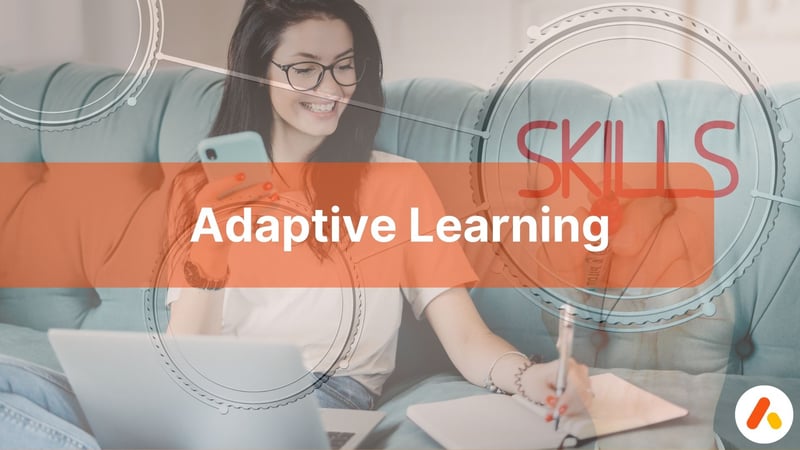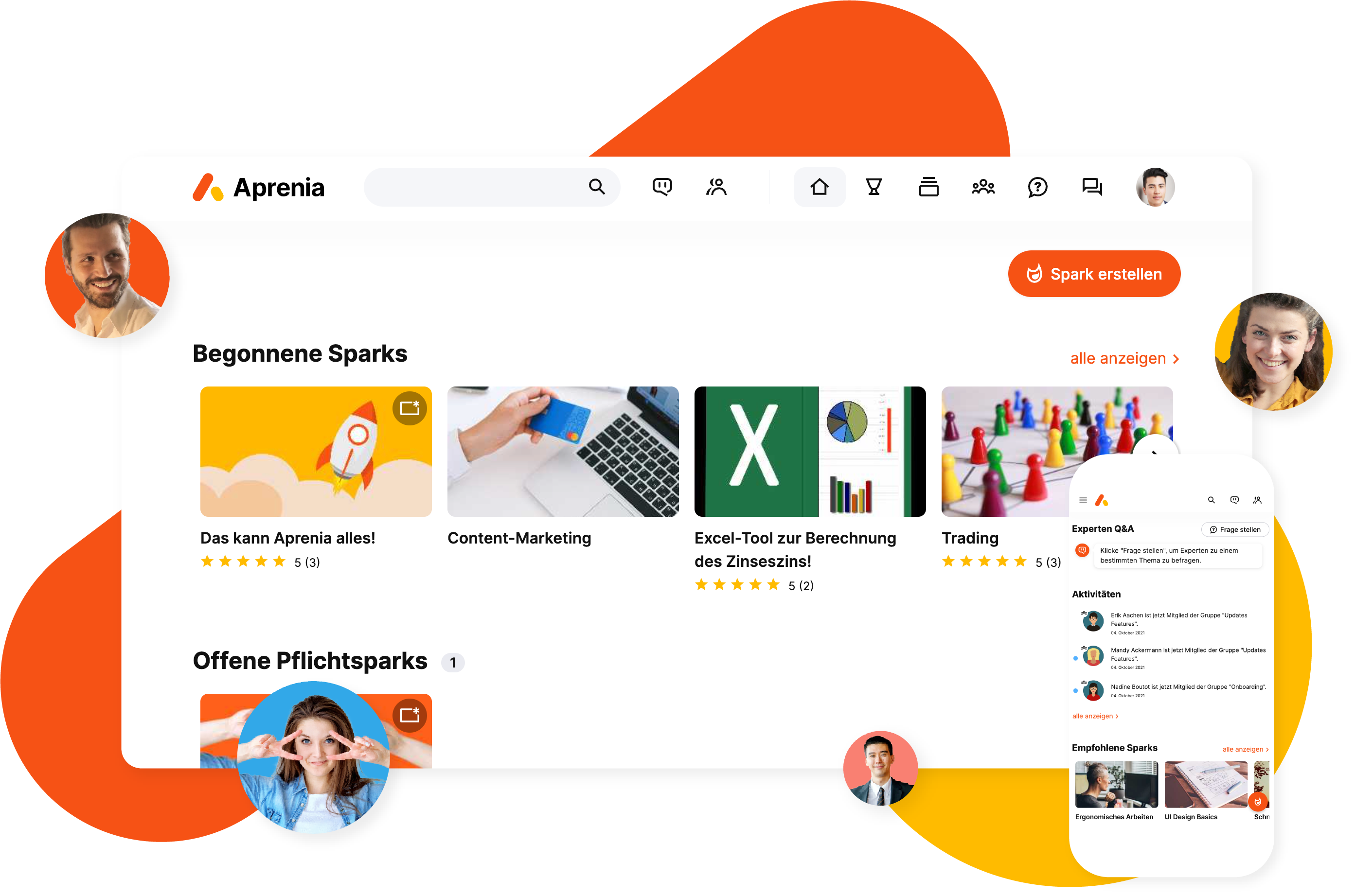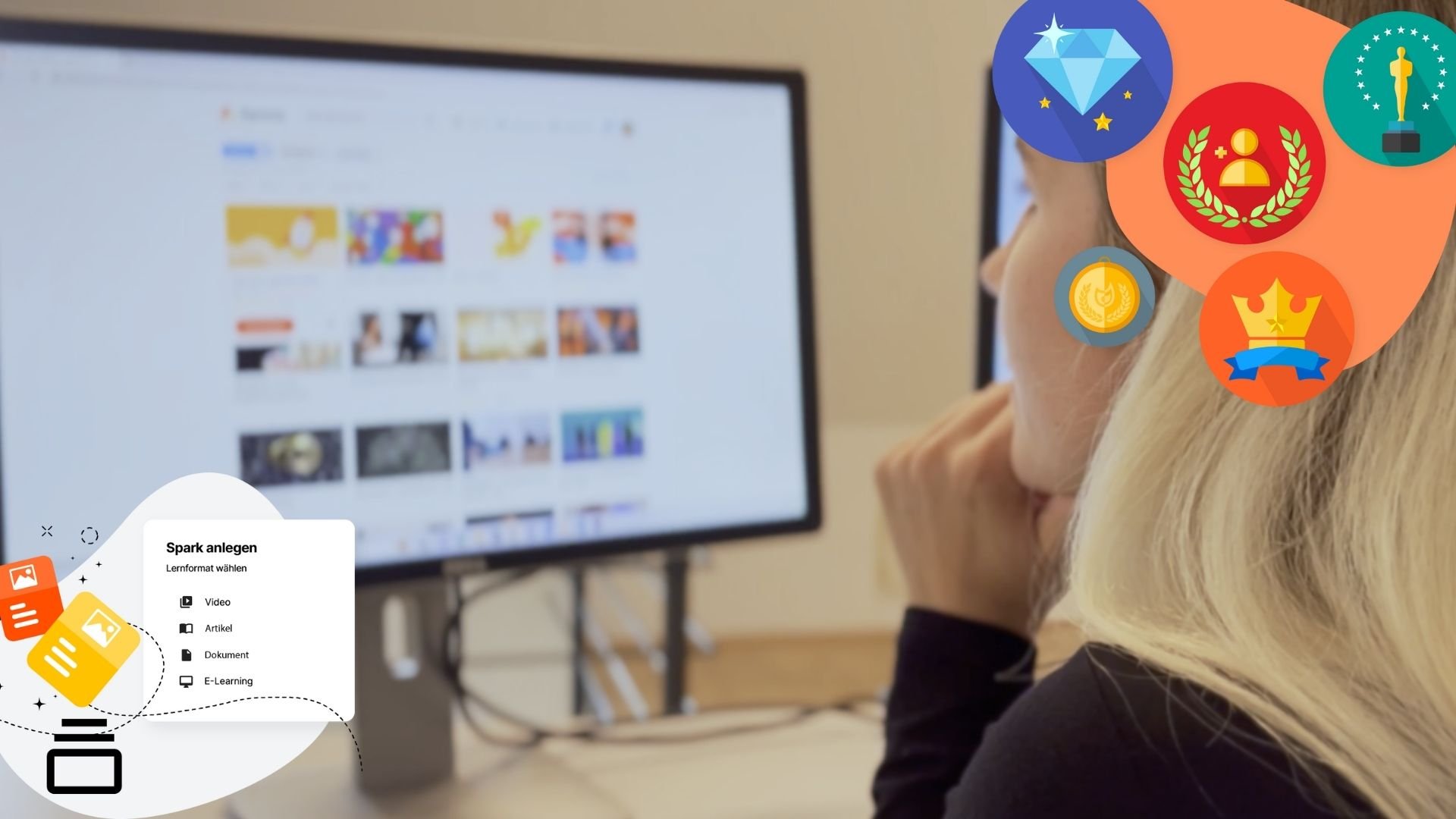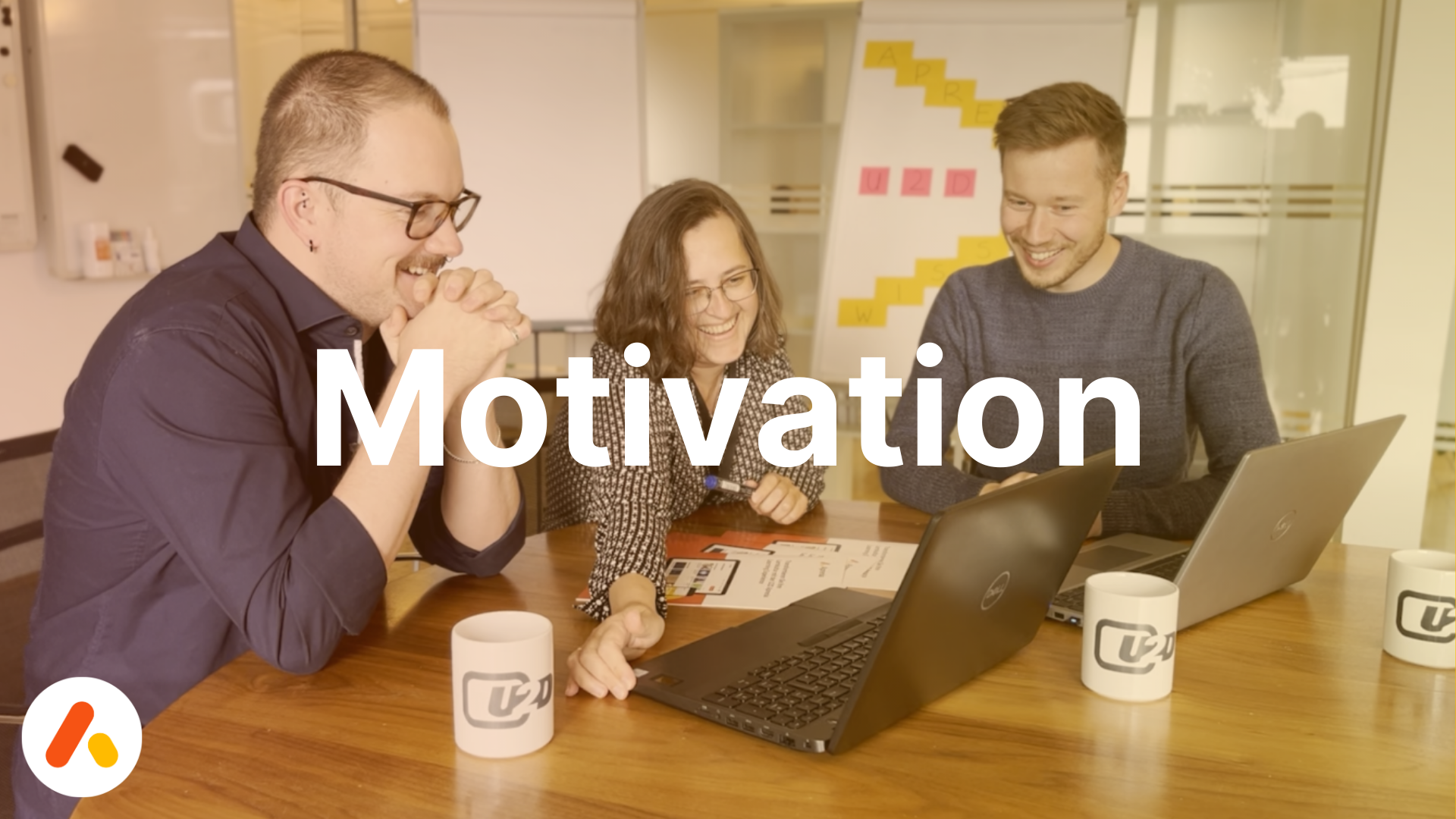Discover your learning strategy and encourage different learning types in the workplace. Everyone...
Effective knowledge transfer in the company with adaptive learning
You may be wondering what exactly adaptive learning is, how it works and how it shapes your corporate training. This article will tell you and also show you how you can make the most of adaptive learning with the help of a Learning Experience Platform (LXP). Discover now how you can effectively train your employees with tailored content and personalized training!

Why adaptive learning in continuing education?
Adaptive learning is transforming continuing education in companies and refers to the concept of adapting the way knowledge is imparted according to the learner's individual level of knowledge, learning preferences and environment in order to ensure comparable learning success for everyone. With the help of adaptive learning, employees can customize knowledge sharing to their individual needs and thus work more effectively and efficiently. The adaptive nature of learning means that the content automatically adapts to the strengths and weaknesses of individual employees.
This enables customized training and education that unlocks the full potential of employees. The use of artificial intelligence and data-driven systems makes learning even more personalized and interactive. Adaptive learning offers companies the opportunity to continuously train their employees and keep them up to date. It not only improves employees' knowledge and skills, but also their motivation and commitment to their work.
What are adaptive learning systems?
Adaptive learning platforms are digital educational tools that enable personalized learning. They adapt to the individual needs and abilities of learners and offer customized learning experiences. These platforms use advanced technologies such as artificial intelligence and machine learning to analyze the progress of learners and adapt the learning material accordingly
These systems continuously collect data on learner behavior and performance, analyze it and then provide tailored content and assignments. By tracking the progress of individual employees, adaptive learning systems can provide targeted feedback and adjust the difficulty of tasks accordingly.
Adaptive learning allows employees to control their own learning process and focus on the content that is most relevant to them. By analysing data on learning behaviour, personalized learning paths are created that take into account the individual's level of knowledge and pace of learning. This leads to effective training, as all employees receive exactly the knowledge they need to successfully complete their tasks.

Advantages of adaptive learning for companies
Companies benefit from the advantages of adaptive learning in continuing education. They include:
-
Individual development: Adaptive learning enables companies to create personalized learning paths for their employees that take into account their individual needs, learning styles and skills.
-
Increased efficiency: By adapting the learning process to the specific requirements of all employees, training times can be shortened and learning efficiency improved.
-
Better learning outcomes: The individualized approach of adaptive learning often leads to improved learning outcomes as employees are better supported and motivated.
-
Cost savings: By optimizing learning materials and processes, companies can reduce training and development costs as fewer resources are needed for ineffective training.
-
Flexibility: Adaptive learning enables employees to learn regardless of time and place, promoting flexibility and adaptability, especially in an increasingly digital workplace.
-
Measurable results: By analyzing learning progress and outcomes, companies can accurately measure the success of their training programs and make adjustments as necessary to achieve desired goals.
-
Knowledge management: Adaptive learning platforms such as the Learning Experience Platform (LXP) U2D Aprenia offer knowledge resource management capabilities that enable companies to effectively capture, organize and share knowledge to promote productivity and knowledge sharing.
Possible applications of adaptive learning in the corporate context
Adaptive learning offers a wide range of possible applications in the corporate context. By intelligently adapting the learning content to the individual needs of employees, it enables customized training. Companies can enhance their training programs by integrating adaptive learning into their e-learning system. This gives employees the opportunity to learn flexibly and independently without losing the common thread.
When implementing adaptive learning in a company, there are various challenges that need to be overcome. One such challenge, for example, is selecting a suitable learning platform that meets the company's requirements and can be seamlessly integrated into the existing training system. With U2D Aprenia, companies are ideally positioned: The Learning Experience Platform (LXP) adapts to the respective needs and can also be integrated into existing learning systems via an interface.
Furthermore, the provision of relevant and engaging content is of great importance to maintain employee motivation in adaptive learning. In addition, data and information should be carefully analyzed to better understand the individual learning needs of employees and offer tailored learning content. In order to successfully overcome these challenges, solutions such as an LXP are available that enable the effective use of adaptive learning in the company.
Success factors in the implementation of adaptive learning
Successful implementation of adaptive learning in a company requires certain success factors to be taken into account. A solid technological basis - a well-structured learning management system (LMS) or an LXP - is essential to effectively deliver adaptive learning content. The integration of artificial intelligence enables learning to be individually adapted to the needs of employees.
Regular evaluation and analysis of the data is crucial to measure progress and continuously improve the adaptive system. It is also important to communicate clear training objectives to employees and actively involve them in the process. Targeted e-learning and customized content motivate learners and promote their knowledge in the long term. Comprehensive support or personal mentoring increases employee acceptance and commitment. With a successful implementation of adaptive learning, companies can optimize their training measures and thus respond more effectively to individual needs.

The LXP U2D Aprenia for the effective use of adaptive learning in the company
The Learning Experience Platform (LXP) U2D Aprenia offers companies an effective way to use adaptive learning in continuing education. With this learning platform, employees can adapt their learning to individual needs and skills.
One example of this is the personalized content selection based on data analysis and artificial intelligence. In this way, learners receive customized content that optimally matches their skills. Suitable content is recommended in U2D Aprenia. The platform also enables an interactive and motivating learning experience. By using adaptive learning, companies can optimize their training measures and offer employees a flexible and efficient learning environment. The practical examples show how the company U2D Aprenia is already successfully using adaptive learning in training and has achieved positive results as a result. With this innovative technology, nothing stands in the way of successful further training in the company.
U2D Aprenia is an innovative platform for companies that aims to use Adaptive Learning effectively. Adaptive learning refers to a teaching and learning method in which the learning process is adapted to the individual needs and abilities of each learner. This is done by using technologies such as machine learning and artificial intelligence to monitor learning progress and create personalized learning paths.
The LXP U2D Aprenia offers several features and benefits for companies:
-
Personalized learning content and journeys: the platform analyzes each employee's learning needs and provides customized learning content and journeys tailored to their individual strengths, weaknesses and learning styles.
-
Adaptive assessment: The platform uses adaptive assessment methods to continuously monitor learning progress and provide feedback. This allows employees to be supported exactly where they need it most.
-
Efficient training planning: By automating learning paths and adapting to individual learning progress, companies can plan training programs more efficiently and make optimal use of resources.
-
Flexible learning: Employees can access the LXP U2D Aprenia via different devices (including mobile app) and at any time, allowing them to learn flexibly and integrate their learning process into their daily work routine.
-
Data-driven insights: The platform provides detailed insights into employee learning progress and performance, enabling organizations to make informed decisions and continuously improve their training strategies.
Conclusion: Effective further training with the help of adaptive learning
Effective further training in the company is made possible through the use of adaptive learning. This concept uses technology and intelligent algorithms to adapt learning to the individual needs of employees. By adapting the learning content and pace to the skills and interests of learners, adaptive learning increases the efficiency and effectiveness of training. Companies benefit from a customized training system that is constantly evolving and based on the latest data.
Adaptive learning offers numerous advantages for companies. It enables the flexible design of learning processes, increases employee motivation and promotes continuous personal development. It also reduces costs through efficient use of resources and reduced downtime. The integration of a learning experience platform (LXP) such as U2D Aprenia supports the successful use of adaptive learning in the company.
The implementation of Adaptive Learning in conjunction with the LXP U2D Aprenia provides a customized and efficient learning experience for employees. The platform uses adaptive technologies to customize the learning process based on skills, pace and preferences.
By personalizing learning content and continuously adapting to individual progress, employees can learn more effectively and in a more targeted manner. The platform enables flexible use across different devices and time zones, allowing employees to integrate their training into their daily work routine.
In addition, the LXP U2D Aprenia provides comprehensive data analytics and insights that enable organizations to track their employees' progress and continuously improve their training strategies. The combination of Adaptive Learning and this LXP thus creates a powerful tool for promoting employee development and knowledge sharing within the company.
Related topics


Motivational killers in corporate learning can significantly affect productivity and employee...

Knowledge transfer has gained importance in the corporate culture. But many responsible people are...
